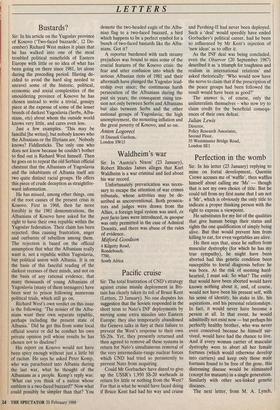Pacific cruise
Sir: The total frustration of CND's strategy against cruise missile deployment in Bri- tain has clearly taken its toll of Bruce Kent (Letters, 23 January). No one disputes his suggestion that the Soviets responded in the short term to Nato's INF deployments by moving some extra missiles into Eastern Europe: they also temporarily abandoned the Geneva talks in fury at their failure to prevent the West's response to their own SS-20s. Yet, they presently returned and then agreed to remove all these systems in return for Nato's simultaneous removal of the very intermediate-range nuclear forces which CND had tried so persistently to prevent Nato from acquiring.
Could Mr Gorbachev have dared to give up the USSR's 1,950 SS-20 warheads in return for little or nothing from the West? For that is what he would have faced doing if Bruce Kent had had his way and cruise and Pershing-II had never been deployed. Such a 'deal' would speedily have ended Gorbachev's political career, had he been so influenced by Mr Kent's injection of `new ideas' as to offer it.
As the INF deal was being concluded, even the Observer (20 September 1987) described it as 'a triumph for toughness and realism in international relations' and asked rhetorically: 'Who would now have the nerve to claim that if the prescription of the peace groups had been followed the result would have been as good?'
The answer is, of course, only the unilateralists themselves – who now try to claim credit for the beneficial consequ- ences of their own defeat.
Julian Lewis
Director, Policy Research Associates, Second Floor, 35 Westminster Bridge Road, London SE1


















































 Previous page
Previous page